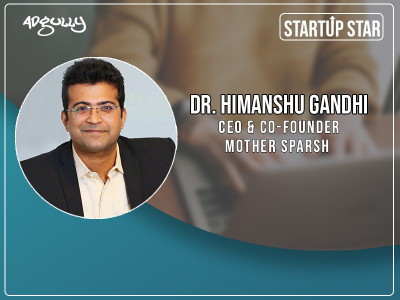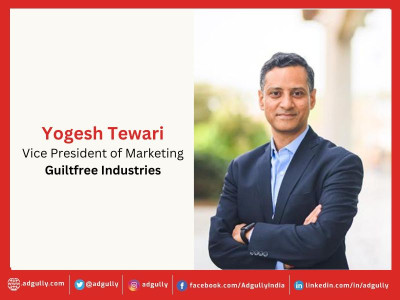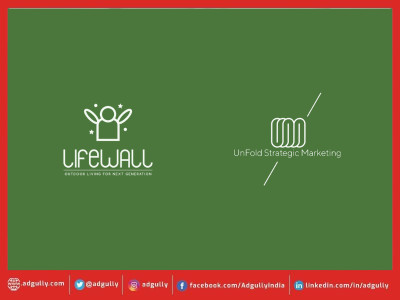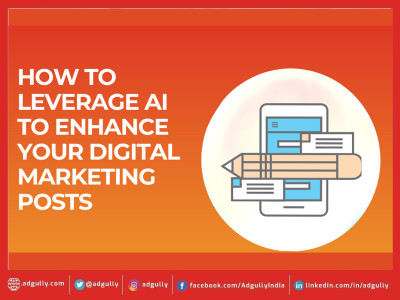Seed funding continues to be a major concern for the start-up ecosystem: Himanshu Gandhi
While the global pandemic has bought economies to a halt and massively disrupted businesses, it has also fuelled start-up dreams and we even saw several Indian start-ups achieve Unicorn status during the pandemic period. The times have never been better for the budding entrepreneurs to give wings to their start-up dreams.
The Government, too, has come up with various schemes to support its ‘Vocal for Local’ drive. A case in point is the Rs 1,000 crore Start-up India Seed Fund announced by Prime Minister Narendra Modi during the Start-up India International Summit 2021 held earlier this year.
Adgully is turning the spotlight on the entrepreneurs who fought against all odds to bring their dreams to fruition in our special series – START-UP STARS. We at Adgully wholeheartedly support the ‘Vocal for Local’ movement and over the next few months will be featuring all local/ homegrown businesses, brands and Apps.
The entrepreneurial journey of Himanshu Gandhi, CEO & Co-founder, Mother Sparsh, and his wife Rishu Gandhi, Co-founder, Mother Sparsh, began after their marriage. Prior to the launch of this brand, Rishu was a Java developer at Infosys while Himanshu was a government official. After their marriage, they discovered a joint desire to do something about the gaps in baby and mother care. They carried out rigorous R&D, their first stepping stone, as they wanted to develop products on a need-based proposition. Himanshu and Rishu spent the initial few years in identifying the gaps and then in exploring nature-oriented solutions for babies and millennial moms.
In conversation with Adgully, Himanshu Gandhi, CEO & Co-founder, Mother Sparsh, speaks about the journey of Mother Sparsh, need of solutions to meet the day-to-day needs of babies and mothers and much more.
What need gap did you want to fulfil with your start-up? What is the core business proposition?
The clarity was there since the beginning about the issue that we wanted to address through our brand and product range. We realised that there were hardly any nature-based solutions to meet the day-to-day needs of babies and mothers. Through botanically sourced Ayurvedic herbs, plant-powered products, healing based solutions comprising natural offerings like turmeric, etc., we have provided a plethora of natural and holistic personal care solutions for the little ones as well as current generation of millennial moms. Besides, we have also been very particular about the after effects of products on the environment, which is why we made sure that our very first product – unscented 99% Pure Water baby wipes – was completely biodegradable.
How did you identify your TG? Did you carry out any feasibility study prior to starting your business?
Since we spent the first couple of years in thorough research and development, which were directed towards fulfilling the needs of babies and moms, identification of the TG was not a major challenge or bottleneck for us. However, we did use various tools to reach out to them through authentic and impactful channels. Initially we even sent out free samples to users, who reacted positively to our products. When we started getting repeated orders, we were sure that Mother Sparsh had hit the right note and moving in the right direction towards ensuring the wellbeing of moms and their little ones.
What were the challenges that you faced in your start-up journey and how did you overcome them?
You come across a number of challenges when you become a part of the start-up ecosystem. Usually it starts with issues related to procurement of raw materials, supply chain management and thereafter finalising the medium to reach out to the desired consumers. However, for Mother Sparsh the foremost challenge I would say was to ascertain the actual needs of those we cater to, that is, babies and mothers. The saviour for us in this regard was our comprehensive R&D, wherein we explored all aspects of the segment and business. Also, we have tried to tackle all challenges holistically by relying on an omni-channel approach, which reduced our dependency on any particular mode or channel. The omni-channel mechanism also helped us a great deal while sailing against the tide during the pandemic.
What were the clearances that you required for your venture from various authorities?
Each of our products is manufactured after obtaining due approval from respective government or designated authorities. We ought to provide relevant documents time and again so that each product launch is approved beforehand.
Prime Minister Modi announced a Startup India Seed Fund earlier this year. How do you see start-ups benefiting from it?
We have seen several initiatives under the current dispensation that are directed at bolstering the start-up ecosystem in India. Among the most significant government initiatives in this regard has been Start-Up India, which recognises and supports fresh talents across different industries. The announcement on Startup India seed fund made by Prime Minister Narendra Modi is yet another welcome step that can give much needed boost and encouragement to entrepreneurs who are eyeing to disrupt varied verticals and spaces.
Funds/ finance is the prime issue of almost all start-ups. What can the industry and the Government do to address this issue and ease the capital requirements of start-ups?
To ease the capital requirement in the initial stages, start-ups can opt for easy finance schemes to obtain easy hassle-free loans. However, seed funding continues to be one of the major concerns for the start-up ecosystem as a whole. While the banks can make some policies, the government on its part can appoint autonomous bodies that can work on this part to make the system frictionless. These government-appointed bodies can work along with the start-ups themselves to ease the process of securing funds.
How is digital helping you further your business?
The exposure of information is extremely high because of digital growth in today’s era, further aided by increased Internet and smartphone penetration. This evolution is providing ample opportunity to start-ups and companies, where they can communicate to the relevant audience through digital platforms directly and in a more effective manner.
The ease of consumer tapping that comes with digital is also something that gives it an edge, as the desired group can be targeted effectively. There are different tools such as digital marketing, digital ads, etc., that make the process easier and much more streamlined. Since the digital media itself is still in its nascent phase, especially in India, it enables the right prospect to tap in users for communicating product or brand differentiation to the target audience at a very early phase.
What were your key learnings so far? How do you see the start-up ecosystem progressing in 2021?
One of the key learnings is that when a product or service is developed on the basis of a need-based proposition, it is bound to resonate better with the end users. They look up to a brand with such approach as they feel that their most pertinent issues are being addressed. But before anything else, it is important to have a clear vision about your brand, the roadmap to growth and tools to raise awareness about the offerings.
Regarding the start-up ecosystem, it is growing at a rapid pace not just in India, but also globally. The pandemic, too, has acted as a catalyst in this regard, with many D2C start-ups seeing the light of the day. Various start-ups have emerged over the past few years that are disrupting traditional as well as new-age domains.
What would be your message for the budding entrepreneurs?
My message for budding entrepreneurs would be that they should work towards identification of right opportunities and channelise their efforts in the desired direction. The most important note to be taken is with regard to opportunities, that is, to start with they should initially identify the opportunities across different fields and domains that suit them the best and also solves a persisting problem. The other important aspects are planning and execution management, which basically refers to entering a business at the right time. Apart from this, the budding entrepreneurs must always remember that businesses are not made just with a lot of efforts but instead are also established by making lesser mistakes for sustenance and growth.
















Share
Facebook
YouTube
Tweet
Twitter
LinkedIn